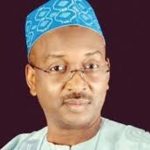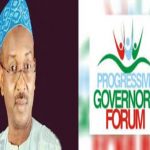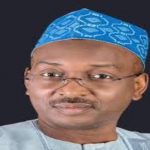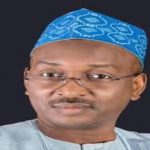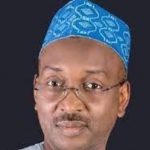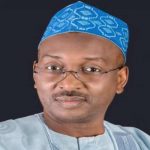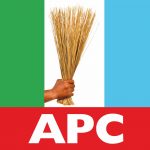The Director General of the Progressives Governors’ Forum, Salihu Lukman, has asked the leaders of the All Progressives Congress must return to that 2013 mode and handle leadership negotiations for 2023 very carefully and skillfully.
APC which was birthed in 2013, weighed the prevailing political circumstances in which former President Goodluck Jonathan from the Southern part of the country was vying for the Presidency under the plaftorm of the Peoples Democratic Party (PDP) and settled for Muhammadu Buhari from North.
While APC’s victory in 2015 could be attributed for zoning the Presidency to the North which was craving for the exalted office, the party is yet to make its position known in the face of agitation for power shift to the Southern part of the country ahead of 2023.
But Salihu in statement said, with the emergence of APC in 2013, the party’s leaders were able to skillfully handle negotiations for leadership based on strategic consideration of winning the votes of Nigerians.
The Director General of the Progressive Governors Forum (PGF), opined that APC should continue to work towards setting the right standards for Nigerian politics, which should prioritise national unity.
He called for a campaign to review provisions of the APC manifesto to strengthen political initiatives for national unity in the process of re-organisation going on in the party.
According to Salihu, part of the projection should be to get the next National Convention of the party adopt a new manifesto, which would highlight major commitments of the party for national unity to be use during the 2023 campaigns.
He said: “Integral to the campaign for national unity is the issue of how the party intend to handle negotiation for the emergence of the standard bearer for 2023 elections.
“In many respects, these are issues that should be handled internally within the structures of the party with all the confidence that principles of justice, equity and fairness can be achieved.
“Inability of Nigerian politics to facilitate political negotiations and consensus building is responsible for the current difficulties facing all the geo-political zones of the country. The big question is whether the contest for leadership of the country in 2023 will prioritise processes of national consensus building through negotiations and agreement.
“Will political leaders from all the six geo-political regions commit themselves to implementing agreements that can strengthen the bonds of unity among citizens from the six geo-political regions? What could be the details of such agreements? And to what extent could the agreements meet the expectations of citizens from all the six geo-political regions”, he queried.
Salihu further asked that beyond which region produces the successor to President Buhari, what will be the commitment of the post-2023 Nigerian President to specific agenda of regional developments of both the region he/she come from and the other five regions?
He also said lack of unity was responsible for the present challenges facing Nigeria such as the insecurity in almost all parts of the country and secessionist agitations undermining the state machinery.
“Nigeria is experiencing secessionist agitations from two groups from two sections of the country – Nnamdi Kanu’s group in the South-East and Sunday Igboho’s in the South-West. These are agitations, which have assumed the forms of civil disobedience and in the case of Nnamdi Kanu’s group in South-East, it has graduated to rebellion against the Nigerian state, resulting in attacks on police stations, kidnappings and killings of security personnel and other functionaries of government as well as destructions of government structures.
“With the Boko Haram insurgency in the North-East, which has dragged for over ten years now and the unfortunate loss of thousands of lives, destructions of both public and private properties, the recent secessionist agitations of Nnamdi Kano and Sunday Igboho require effective and efficient responses to maintain Nigeria as a united country.
“Noting also the rising incidences of banditry in the North-West and North-Central, producing more cases of kidnappings and abductions of law-abiding citizens, including schoolchildren, challenges of national survival is basically about strengthening the capacity of Nigerian security agencies to prevent and arrest criminal activities of rebellious groups in all parts of the country”, Salihu added.
The Director General of the Progressives Governors’ Forum, Salihu Lukman, has asked the leaders of the All Progressives Congress must return to that 2013 mode and handle leadership negotiations for 2023 very carefully and skillfully.
APC which was birthed in 2013, weighed the prevailing political circumstances in which former President Goodluck Jonathan from the Southern part of the country was vying for the Presidency under the plaftorm of the Peoples Democratic Party (PDP) and settled for Muhammadu Buhari from North.
While APC’s victory in 2015 could be attributed for zoning the Presidency to the North which was craving for the exalted office, the party is yet to make its position known in the face of agitation for power shift to the Southern part of the country ahead of 2023.
But Salihu in statement said, with the emergence of APC in 2013, the party’s leaders were able to skillfully handle negotiations for leadership based on strategic consideration of winning the votes of Nigerians.
The Director General of the Progressive Governors Forum (PGF), opined that APC should continue to work towards setting the right standards for Nigerian politics, which should prioritise national unity.
He called for a campaign to review provisions of the APC manifesto to strengthen political initiatives for national unity in the process of re-organisation going on in the party.
According to Salihu, part of the projection should be to get the next National Convention of the party adopt a new manifesto, which would highlight major commitments of the party for national unity to be use during the 2023 campaigns.
He said: “Integral to the campaign for national unity is the issue of how the party intend to handle negotiation for the emergence of the standard bearer for 2023 elections.
“In many respects, these are issues that should be handled internally within the structures of the party with all the confidence that principles of justice, equity and fairness can be achieved.
“Inability of Nigerian politics to facilitate political negotiations and consensus building is responsible for the current difficulties facing all the geo-political zones of the country. The big question is whether the contest for leadership of the country in 2023 will prioritise processes of national consensus building through negotiations and agreement.
“Will political leaders from all the six geo-political regions commit themselves to implementing agreements that can strengthen the bonds of unity among citizens from the six geo-political regions? What could be the details of such agreements? And to what extent could the agreements meet the expectations of citizens from all the six geo-political regions”, he queried.
Salihu further asked that beyond which region produces the successor to President Buhari, what will be the commitment of the post-2023 Nigerian President to specific agenda of regional developments of both the region he/she come from and the other five regions?
He also said lack of unity was responsible for the present challenges facing Nigeria such as the insecurity in almost all parts of the country and secessionist agitations undermining the state machinery.
“Nigeria is experiencing secessionist agitations from two groups from two sections of the country – Nnamdi Kanu’s group in the South-East and Sunday Igboho’s in the South-West. These are agitations, which have assumed the forms of civil disobedience and in the case of Nnamdi Kanu’s group in South-East, it has graduated to rebellion against the Nigerian state, resulting in attacks on police stations, kidnappings and killings of security personnel and other functionaries of government as well as destructions of government structures.
“With the Boko Haram insurgency in the North-East, which has dragged for over ten years now and the unfortunate loss of thousands of lives, destructions of both public and private properties, the recent secessionist agitations of Nnamdi Kano and Sunday Igboho require effective and efficient responses to maintain Nigeria as a united country.
“Noting also the rising incidences of banditry in the North-West and North-Central, producing more cases of kidnappings and abductions of law-abiding citizens, including schoolchildren, challenges of national survival is basically about strengthening the capacity of Nigerian security agencies to prevent and arrest criminal activities of rebellious groups in all parts of the country”, Salihu added.
The Director General of the Progressives Governors’ Forum, Salihu Lukman, has asked the leaders of the All Progressives Congress must return to that 2013 mode and handle leadership negotiations for 2023 very carefully and skillfully.
APC which was birthed in 2013, weighed the prevailing political circumstances in which former President Goodluck Jonathan from the Southern part of the country was vying for the Presidency under the plaftorm of the Peoples Democratic Party (PDP) and settled for Muhammadu Buhari from North.
While APC’s victory in 2015 could be attributed for zoning the Presidency to the North which was craving for the exalted office, the party is yet to make its position known in the face of agitation for power shift to the Southern part of the country ahead of 2023.
But Salihu in statement said, with the emergence of APC in 2013, the party’s leaders were able to skillfully handle negotiations for leadership based on strategic consideration of winning the votes of Nigerians.
The Director General of the Progressive Governors Forum (PGF), opined that APC should continue to work towards setting the right standards for Nigerian politics, which should prioritise national unity.
He called for a campaign to review provisions of the APC manifesto to strengthen political initiatives for national unity in the process of re-organisation going on in the party.
According to Salihu, part of the projection should be to get the next National Convention of the party adopt a new manifesto, which would highlight major commitments of the party for national unity to be use during the 2023 campaigns.
He said: “Integral to the campaign for national unity is the issue of how the party intend to handle negotiation for the emergence of the standard bearer for 2023 elections.
“In many respects, these are issues that should be handled internally within the structures of the party with all the confidence that principles of justice, equity and fairness can be achieved.
“Inability of Nigerian politics to facilitate political negotiations and consensus building is responsible for the current difficulties facing all the geo-political zones of the country. The big question is whether the contest for leadership of the country in 2023 will prioritise processes of national consensus building through negotiations and agreement.
“Will political leaders from all the six geo-political regions commit themselves to implementing agreements that can strengthen the bonds of unity among citizens from the six geo-political regions? What could be the details of such agreements? And to what extent could the agreements meet the expectations of citizens from all the six geo-political regions”, he queried.
Salihu further asked that beyond which region produces the successor to President Buhari, what will be the commitment of the post-2023 Nigerian President to specific agenda of regional developments of both the region he/she come from and the other five regions?
He also said lack of unity was responsible for the present challenges facing Nigeria such as the insecurity in almost all parts of the country and secessionist agitations undermining the state machinery.
“Nigeria is experiencing secessionist agitations from two groups from two sections of the country – Nnamdi Kanu’s group in the South-East and Sunday Igboho’s in the South-West. These are agitations, which have assumed the forms of civil disobedience and in the case of Nnamdi Kanu’s group in South-East, it has graduated to rebellion against the Nigerian state, resulting in attacks on police stations, kidnappings and killings of security personnel and other functionaries of government as well as destructions of government structures.
“With the Boko Haram insurgency in the North-East, which has dragged for over ten years now and the unfortunate loss of thousands of lives, destructions of both public and private properties, the recent secessionist agitations of Nnamdi Kano and Sunday Igboho require effective and efficient responses to maintain Nigeria as a united country.
“Noting also the rising incidences of banditry in the North-West and North-Central, producing more cases of kidnappings and abductions of law-abiding citizens, including schoolchildren, challenges of national survival is basically about strengthening the capacity of Nigerian security agencies to prevent and arrest criminal activities of rebellious groups in all parts of the country”, Salihu added.
The Director General of the Progressives Governors’ Forum, Salihu Lukman, has asked the leaders of the All Progressives Congress must return to that 2013 mode and handle leadership negotiations for 2023 very carefully and skillfully.
APC which was birthed in 2013, weighed the prevailing political circumstances in which former President Goodluck Jonathan from the Southern part of the country was vying for the Presidency under the plaftorm of the Peoples Democratic Party (PDP) and settled for Muhammadu Buhari from North.
While APC’s victory in 2015 could be attributed for zoning the Presidency to the North which was craving for the exalted office, the party is yet to make its position known in the face of agitation for power shift to the Southern part of the country ahead of 2023.
But Salihu in statement said, with the emergence of APC in 2013, the party’s leaders were able to skillfully handle negotiations for leadership based on strategic consideration of winning the votes of Nigerians.
The Director General of the Progressive Governors Forum (PGF), opined that APC should continue to work towards setting the right standards for Nigerian politics, which should prioritise national unity.
He called for a campaign to review provisions of the APC manifesto to strengthen political initiatives for national unity in the process of re-organisation going on in the party.
According to Salihu, part of the projection should be to get the next National Convention of the party adopt a new manifesto, which would highlight major commitments of the party for national unity to be use during the 2023 campaigns.
He said: “Integral to the campaign for national unity is the issue of how the party intend to handle negotiation for the emergence of the standard bearer for 2023 elections.
“In many respects, these are issues that should be handled internally within the structures of the party with all the confidence that principles of justice, equity and fairness can be achieved.
“Inability of Nigerian politics to facilitate political negotiations and consensus building is responsible for the current difficulties facing all the geo-political zones of the country. The big question is whether the contest for leadership of the country in 2023 will prioritise processes of national consensus building through negotiations and agreement.
“Will political leaders from all the six geo-political regions commit themselves to implementing agreements that can strengthen the bonds of unity among citizens from the six geo-political regions? What could be the details of such agreements? And to what extent could the agreements meet the expectations of citizens from all the six geo-political regions”, he queried.
Salihu further asked that beyond which region produces the successor to President Buhari, what will be the commitment of the post-2023 Nigerian President to specific agenda of regional developments of both the region he/she come from and the other five regions?
He also said lack of unity was responsible for the present challenges facing Nigeria such as the insecurity in almost all parts of the country and secessionist agitations undermining the state machinery.
“Nigeria is experiencing secessionist agitations from two groups from two sections of the country – Nnamdi Kanu’s group in the South-East and Sunday Igboho’s in the South-West. These are agitations, which have assumed the forms of civil disobedience and in the case of Nnamdi Kanu’s group in South-East, it has graduated to rebellion against the Nigerian state, resulting in attacks on police stations, kidnappings and killings of security personnel and other functionaries of government as well as destructions of government structures.
“With the Boko Haram insurgency in the North-East, which has dragged for over ten years now and the unfortunate loss of thousands of lives, destructions of both public and private properties, the recent secessionist agitations of Nnamdi Kano and Sunday Igboho require effective and efficient responses to maintain Nigeria as a united country.
“Noting also the rising incidences of banditry in the North-West and North-Central, producing more cases of kidnappings and abductions of law-abiding citizens, including schoolchildren, challenges of national survival is basically about strengthening the capacity of Nigerian security agencies to prevent and arrest criminal activities of rebellious groups in all parts of the country”, Salihu added.
The Director General of the Progressives Governors’ Forum, Salihu Lukman, has asked the leaders of the All Progressives Congress must return to that 2013 mode and handle leadership negotiations for 2023 very carefully and skillfully.
APC which was birthed in 2013, weighed the prevailing political circumstances in which former President Goodluck Jonathan from the Southern part of the country was vying for the Presidency under the plaftorm of the Peoples Democratic Party (PDP) and settled for Muhammadu Buhari from North.
While APC’s victory in 2015 could be attributed for zoning the Presidency to the North which was craving for the exalted office, the party is yet to make its position known in the face of agitation for power shift to the Southern part of the country ahead of 2023.
But Salihu in statement said, with the emergence of APC in 2013, the party’s leaders were able to skillfully handle negotiations for leadership based on strategic consideration of winning the votes of Nigerians.
The Director General of the Progressive Governors Forum (PGF), opined that APC should continue to work towards setting the right standards for Nigerian politics, which should prioritise national unity.
He called for a campaign to review provisions of the APC manifesto to strengthen political initiatives for national unity in the process of re-organisation going on in the party.
According to Salihu, part of the projection should be to get the next National Convention of the party adopt a new manifesto, which would highlight major commitments of the party for national unity to be use during the 2023 campaigns.
He said: “Integral to the campaign for national unity is the issue of how the party intend to handle negotiation for the emergence of the standard bearer for 2023 elections.
“In many respects, these are issues that should be handled internally within the structures of the party with all the confidence that principles of justice, equity and fairness can be achieved.
“Inability of Nigerian politics to facilitate political negotiations and consensus building is responsible for the current difficulties facing all the geo-political zones of the country. The big question is whether the contest for leadership of the country in 2023 will prioritise processes of national consensus building through negotiations and agreement.
“Will political leaders from all the six geo-political regions commit themselves to implementing agreements that can strengthen the bonds of unity among citizens from the six geo-political regions? What could be the details of such agreements? And to what extent could the agreements meet the expectations of citizens from all the six geo-political regions”, he queried.
Salihu further asked that beyond which region produces the successor to President Buhari, what will be the commitment of the post-2023 Nigerian President to specific agenda of regional developments of both the region he/she come from and the other five regions?
He also said lack of unity was responsible for the present challenges facing Nigeria such as the insecurity in almost all parts of the country and secessionist agitations undermining the state machinery.
“Nigeria is experiencing secessionist agitations from two groups from two sections of the country – Nnamdi Kanu’s group in the South-East and Sunday Igboho’s in the South-West. These are agitations, which have assumed the forms of civil disobedience and in the case of Nnamdi Kanu’s group in South-East, it has graduated to rebellion against the Nigerian state, resulting in attacks on police stations, kidnappings and killings of security personnel and other functionaries of government as well as destructions of government structures.
“With the Boko Haram insurgency in the North-East, which has dragged for over ten years now and the unfortunate loss of thousands of lives, destructions of both public and private properties, the recent secessionist agitations of Nnamdi Kano and Sunday Igboho require effective and efficient responses to maintain Nigeria as a united country.
“Noting also the rising incidences of banditry in the North-West and North-Central, producing more cases of kidnappings and abductions of law-abiding citizens, including schoolchildren, challenges of national survival is basically about strengthening the capacity of Nigerian security agencies to prevent and arrest criminal activities of rebellious groups in all parts of the country”, Salihu added.
The Director General of the Progressives Governors’ Forum, Salihu Lukman, has asked the leaders of the All Progressives Congress must return to that 2013 mode and handle leadership negotiations for 2023 very carefully and skillfully.
APC which was birthed in 2013, weighed the prevailing political circumstances in which former President Goodluck Jonathan from the Southern part of the country was vying for the Presidency under the plaftorm of the Peoples Democratic Party (PDP) and settled for Muhammadu Buhari from North.
While APC’s victory in 2015 could be attributed for zoning the Presidency to the North which was craving for the exalted office, the party is yet to make its position known in the face of agitation for power shift to the Southern part of the country ahead of 2023.
But Salihu in statement said, with the emergence of APC in 2013, the party’s leaders were able to skillfully handle negotiations for leadership based on strategic consideration of winning the votes of Nigerians.
The Director General of the Progressive Governors Forum (PGF), opined that APC should continue to work towards setting the right standards for Nigerian politics, which should prioritise national unity.
He called for a campaign to review provisions of the APC manifesto to strengthen political initiatives for national unity in the process of re-organisation going on in the party.
According to Salihu, part of the projection should be to get the next National Convention of the party adopt a new manifesto, which would highlight major commitments of the party for national unity to be use during the 2023 campaigns.
He said: “Integral to the campaign for national unity is the issue of how the party intend to handle negotiation for the emergence of the standard bearer for 2023 elections.
“In many respects, these are issues that should be handled internally within the structures of the party with all the confidence that principles of justice, equity and fairness can be achieved.
“Inability of Nigerian politics to facilitate political negotiations and consensus building is responsible for the current difficulties facing all the geo-political zones of the country. The big question is whether the contest for leadership of the country in 2023 will prioritise processes of national consensus building through negotiations and agreement.
“Will political leaders from all the six geo-political regions commit themselves to implementing agreements that can strengthen the bonds of unity among citizens from the six geo-political regions? What could be the details of such agreements? And to what extent could the agreements meet the expectations of citizens from all the six geo-political regions”, he queried.
Salihu further asked that beyond which region produces the successor to President Buhari, what will be the commitment of the post-2023 Nigerian President to specific agenda of regional developments of both the region he/she come from and the other five regions?
He also said lack of unity was responsible for the present challenges facing Nigeria such as the insecurity in almost all parts of the country and secessionist agitations undermining the state machinery.
“Nigeria is experiencing secessionist agitations from two groups from two sections of the country – Nnamdi Kanu’s group in the South-East and Sunday Igboho’s in the South-West. These are agitations, which have assumed the forms of civil disobedience and in the case of Nnamdi Kanu’s group in South-East, it has graduated to rebellion against the Nigerian state, resulting in attacks on police stations, kidnappings and killings of security personnel and other functionaries of government as well as destructions of government structures.
“With the Boko Haram insurgency in the North-East, which has dragged for over ten years now and the unfortunate loss of thousands of lives, destructions of both public and private properties, the recent secessionist agitations of Nnamdi Kano and Sunday Igboho require effective and efficient responses to maintain Nigeria as a united country.
“Noting also the rising incidences of banditry in the North-West and North-Central, producing more cases of kidnappings and abductions of law-abiding citizens, including schoolchildren, challenges of national survival is basically about strengthening the capacity of Nigerian security agencies to prevent and arrest criminal activities of rebellious groups in all parts of the country”, Salihu added.
The Director General of the Progressives Governors’ Forum, Salihu Lukman, has asked the leaders of the All Progressives Congress must return to that 2013 mode and handle leadership negotiations for 2023 very carefully and skillfully.
APC which was birthed in 2013, weighed the prevailing political circumstances in which former President Goodluck Jonathan from the Southern part of the country was vying for the Presidency under the plaftorm of the Peoples Democratic Party (PDP) and settled for Muhammadu Buhari from North.
While APC’s victory in 2015 could be attributed for zoning the Presidency to the North which was craving for the exalted office, the party is yet to make its position known in the face of agitation for power shift to the Southern part of the country ahead of 2023.
But Salihu in statement said, with the emergence of APC in 2013, the party’s leaders were able to skillfully handle negotiations for leadership based on strategic consideration of winning the votes of Nigerians.
The Director General of the Progressive Governors Forum (PGF), opined that APC should continue to work towards setting the right standards for Nigerian politics, which should prioritise national unity.
He called for a campaign to review provisions of the APC manifesto to strengthen political initiatives for national unity in the process of re-organisation going on in the party.
According to Salihu, part of the projection should be to get the next National Convention of the party adopt a new manifesto, which would highlight major commitments of the party for national unity to be use during the 2023 campaigns.
He said: “Integral to the campaign for national unity is the issue of how the party intend to handle negotiation for the emergence of the standard bearer for 2023 elections.
“In many respects, these are issues that should be handled internally within the structures of the party with all the confidence that principles of justice, equity and fairness can be achieved.
“Inability of Nigerian politics to facilitate political negotiations and consensus building is responsible for the current difficulties facing all the geo-political zones of the country. The big question is whether the contest for leadership of the country in 2023 will prioritise processes of national consensus building through negotiations and agreement.
“Will political leaders from all the six geo-political regions commit themselves to implementing agreements that can strengthen the bonds of unity among citizens from the six geo-political regions? What could be the details of such agreements? And to what extent could the agreements meet the expectations of citizens from all the six geo-political regions”, he queried.
Salihu further asked that beyond which region produces the successor to President Buhari, what will be the commitment of the post-2023 Nigerian President to specific agenda of regional developments of both the region he/she come from and the other five regions?
He also said lack of unity was responsible for the present challenges facing Nigeria such as the insecurity in almost all parts of the country and secessionist agitations undermining the state machinery.
“Nigeria is experiencing secessionist agitations from two groups from two sections of the country – Nnamdi Kanu’s group in the South-East and Sunday Igboho’s in the South-West. These are agitations, which have assumed the forms of civil disobedience and in the case of Nnamdi Kanu’s group in South-East, it has graduated to rebellion against the Nigerian state, resulting in attacks on police stations, kidnappings and killings of security personnel and other functionaries of government as well as destructions of government structures.
“With the Boko Haram insurgency in the North-East, which has dragged for over ten years now and the unfortunate loss of thousands of lives, destructions of both public and private properties, the recent secessionist agitations of Nnamdi Kano and Sunday Igboho require effective and efficient responses to maintain Nigeria as a united country.
“Noting also the rising incidences of banditry in the North-West and North-Central, producing more cases of kidnappings and abductions of law-abiding citizens, including schoolchildren, challenges of national survival is basically about strengthening the capacity of Nigerian security agencies to prevent and arrest criminal activities of rebellious groups in all parts of the country”, Salihu added.
The Director General of the Progressives Governors’ Forum, Salihu Lukman, has asked the leaders of the All Progressives Congress must return to that 2013 mode and handle leadership negotiations for 2023 very carefully and skillfully.
APC which was birthed in 2013, weighed the prevailing political circumstances in which former President Goodluck Jonathan from the Southern part of the country was vying for the Presidency under the plaftorm of the Peoples Democratic Party (PDP) and settled for Muhammadu Buhari from North.
While APC’s victory in 2015 could be attributed for zoning the Presidency to the North which was craving for the exalted office, the party is yet to make its position known in the face of agitation for power shift to the Southern part of the country ahead of 2023.
But Salihu in statement said, with the emergence of APC in 2013, the party’s leaders were able to skillfully handle negotiations for leadership based on strategic consideration of winning the votes of Nigerians.
The Director General of the Progressive Governors Forum (PGF), opined that APC should continue to work towards setting the right standards for Nigerian politics, which should prioritise national unity.
He called for a campaign to review provisions of the APC manifesto to strengthen political initiatives for national unity in the process of re-organisation going on in the party.
According to Salihu, part of the projection should be to get the next National Convention of the party adopt a new manifesto, which would highlight major commitments of the party for national unity to be use during the 2023 campaigns.
He said: “Integral to the campaign for national unity is the issue of how the party intend to handle negotiation for the emergence of the standard bearer for 2023 elections.
“In many respects, these are issues that should be handled internally within the structures of the party with all the confidence that principles of justice, equity and fairness can be achieved.
“Inability of Nigerian politics to facilitate political negotiations and consensus building is responsible for the current difficulties facing all the geo-political zones of the country. The big question is whether the contest for leadership of the country in 2023 will prioritise processes of national consensus building through negotiations and agreement.
“Will political leaders from all the six geo-political regions commit themselves to implementing agreements that can strengthen the bonds of unity among citizens from the six geo-political regions? What could be the details of such agreements? And to what extent could the agreements meet the expectations of citizens from all the six geo-political regions”, he queried.
Salihu further asked that beyond which region produces the successor to President Buhari, what will be the commitment of the post-2023 Nigerian President to specific agenda of regional developments of both the region he/she come from and the other five regions?
He also said lack of unity was responsible for the present challenges facing Nigeria such as the insecurity in almost all parts of the country and secessionist agitations undermining the state machinery.
“Nigeria is experiencing secessionist agitations from two groups from two sections of the country – Nnamdi Kanu’s group in the South-East and Sunday Igboho’s in the South-West. These are agitations, which have assumed the forms of civil disobedience and in the case of Nnamdi Kanu’s group in South-East, it has graduated to rebellion against the Nigerian state, resulting in attacks on police stations, kidnappings and killings of security personnel and other functionaries of government as well as destructions of government structures.
“With the Boko Haram insurgency in the North-East, which has dragged for over ten years now and the unfortunate loss of thousands of lives, destructions of both public and private properties, the recent secessionist agitations of Nnamdi Kano and Sunday Igboho require effective and efficient responses to maintain Nigeria as a united country.
“Noting also the rising incidences of banditry in the North-West and North-Central, producing more cases of kidnappings and abductions of law-abiding citizens, including schoolchildren, challenges of national survival is basically about strengthening the capacity of Nigerian security agencies to prevent and arrest criminal activities of rebellious groups in all parts of the country”, Salihu added.



